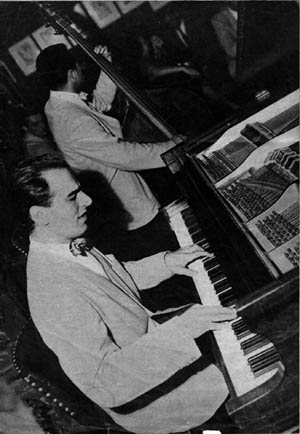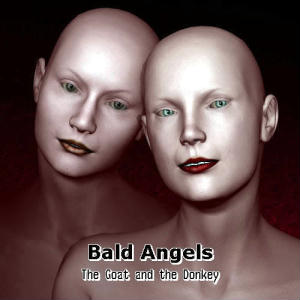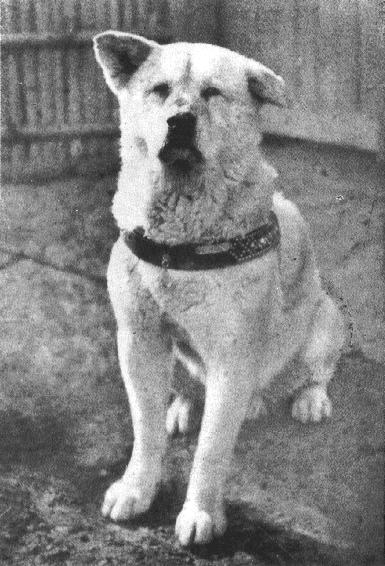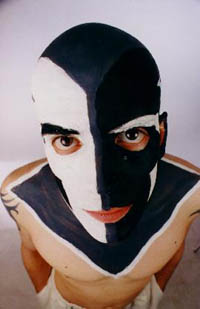/PAlogo_v2.gif)
/PAlogo_v2.gif) |
|
Post Reply 
|
Page <1234> |
| Author | |||
Certif1ed 
Special Collaborator 

Honorary Collaborator Joined: April 08 2004 Location: England Status: Offline Points: 7559 |
 Posted: June 18 2009 at 11:35 Posted: June 18 2009 at 11:35 |
||
What I gave is the essential difference between canon and fugue - yes, you are correct about the various permutations, and that is the big difference between canon and round. I was just trying to keep it simple and not go into technical details. I didn't see your original post, because it's on the previous page, but to re-iterate what I said above, there probably examples in The Enid's music, and definitely some in Shub-Niggurath's.
|
|||
|
The important thing is not to stop questioning.
|
|||
 |
|||
moshkito 
Forum Senior Member 
Joined: January 04 2007 Location: Grok City Status: Offline Points: 18653 |
 Posted: June 18 2009 at 11:26 Posted: June 18 2009 at 11:26 |
||
|
Hi,
NEVER ...
I only listen to his relation PDQ Bach ...
|
|||
 |
|||
The Pessimist 
Prog Reviewer 

Joined: June 13 2007 Location: United Kingdom Status: Offline Points: 3834 |
 Posted: June 18 2009 at 11:03 Posted: June 18 2009 at 11:03 |
||
|
I think I've heard some canon-esque counterpoint in some of Uncle Frank's work, and although a jazz artist, Pat Metheny uses it a little bit as well. But seriously, you've got me racking my brains on this one.
|
|||
|
"Market value is irrelevant to intrinsic value."
Arnold Schoenberg |
|||
 |
|||
meptune 
Forum Senior Member 
Joined: October 01 2008 Location: United States Status: Offline Points: 231 |
 Posted: June 18 2009 at 02:46 Posted: June 18 2009 at 02:46 |
||
|
|||

"Arf, she said" |
|||
 |
|||
Certif1ed 
Special Collaborator 

Honorary Collaborator Joined: April 08 2004 Location: England Status: Offline Points: 7559 |
 Posted: June 18 2009 at 02:25 Posted: June 18 2009 at 02:25 |
||
|
^I have not heard any examples of counterpoint in Opeth either - their acoustic sections tend to be merely 2 or 3 chord riff patterns that are picked and roughly harmonised with parallel movement (predictable 3rds, 6ths, etc - not true counterpoint). I shall have to check out Unexpect - that was unexpected...
 As The Pessimist says, Gentle Giant and ELP are among the very few prog bands that have produced counterpoint of any note. Shub Niggurath are another band who wrote "true" counterpoint, and are well worth checking out from a technical point of view, as they incorporated many classical writing styles in their music - including serialism.
I tend to listen to The Enid more for pleasure than analysis, but I would imagine that they produced a fair amount too. Queen produced some cool counterpoint with the frequent use of the echo machine in their early days, and Marillion's early work features multi-layered melodies which are contrapuntal. I also noticed bits and pieces in Clouds' music. Counterpoint isn't necessarily canon and fugue - it's simply simultaneous independent melody lines. Canon, fugue and round are simply types of contrapuntal writing in which all voices produce the same melody, with the exception of fugue, in which the different voices may develop in different directions. "Independent" is not a fantastic word, as most counterpoint is entirely dependent on the underlying harmonic progressions - and such musical styles as the round (where a melody is sung, and then the exact same melody sung a few bars later by a different voice - e.g. "Sumer Is I-Cumen In") are dependent on the melody being exactly the same and harmonically coherent at the same time. The most interesting forms of counterpoint to me are the fugue (especially multi-subject fugues) and the more free-form, where each part constitues a strong melody and not a mere supporting role dominated by the harmonic structure. This is one reason I enjoy early Marillion so much. The main reason is because I like the music, of course - what they did is hardly at Bach's level  There is contrpuntal writing in most of the "better" prog - it's part of what gives it the proggy character. You'll hear it in the music of Genesis, Tull, Crimson and Yes among others - and end up hearing it in almost everything. The "dividing line" is the difference between simple parallel harmonisation combined with co-incidental tunefulness in parts, and truly "independent" melody lines. Edited by Certif1ed - June 18 2009 at 02:27 |
|||
|
The important thing is not to stop questioning.
|
|||
 |
|||
meptune 
Forum Senior Member 
Joined: October 01 2008 Location: United States Status: Offline Points: 231 |
 Posted: June 18 2009 at 01:33 Posted: June 18 2009 at 01:33 |
||
Regarding counterpoint, I was refering to, specifically, canon and fugue. I have not heard those from Opeth (I have not heard Unexpect). Do you know of any prog bands, aside from ELP and Gentle Giant that have deliberately used canonic imitation and fugal structure? Edited by meptune - June 18 2009 at 01:34 |
|||

"Arf, she said" |
|||
 |
|||
Ricochet 
Special Collaborator 

Honorary Collaborator Joined: February 27 2005 Location: Nauru Status: Offline Points: 46301 |
 Posted: June 17 2009 at 12:34 Posted: June 17 2009 at 12:34 |
||
|
I'll be learning counterpoint in my next year at the Conservatoire.
And I'm now studying the Chromatic Fantasia and Fugue. Edited by Ricochet - June 17 2009 at 12:34 |
|||

|
|||
 |
|||
BaldFriede 
Prog Reviewer 

Joined: June 02 2005 Location: Germany Status: Offline Points: 10266 |
 Posted: June 17 2009 at 11:57 Posted: June 17 2009 at 11:57 |
||
|
if you want counterpoint, go and listen to Peter Hammill's opera "The Fall of the House of Usher". There is counterpoint in abundance on it.
|
|||
 BaldJean and I; I am the one in blue. |
|||
 |
|||
The Pessimist 
Prog Reviewer 

Joined: June 13 2007 Location: United Kingdom Status: Offline Points: 3834 |
 Posted: June 17 2009 at 09:03 Posted: June 17 2009 at 09:03 |
||
|
I can think of a few non-prog bands that fit that description, like Necrophagist, Cephalic Carnage, Spawn Of Possession, Nile (in a lot of the solos)... As for prog I can only think of two bands at the moment that use contrapuntalism in an effective manner, and they are Opeth (in the acoustic sections) and Unexpect.
|
|||
|
"Market value is irrelevant to intrinsic value."
Arnold Schoenberg |
|||
 |
|||
meptune 
Forum Senior Member 
Joined: October 01 2008 Location: United States Status: Offline Points: 231 |
 Posted: June 17 2009 at 03:19 Posted: June 17 2009 at 03:19 |
||
|
I'm curious, in whose Prog Rock work, besides ELP and Gentle Giant, do you hear a direct influence of Bach? By "direct influence" I am speaking of counterpoint and polyphonic composition, i.e. specifically canon and fugue. Is there any prog artist today writing canons and fugues? Who today is deliberately using canonic imitation and it's concomitant variations in a Prog context? The only one I can think of is a Turkish Stick player named Akin Unver, but he hasn't released a CD that I know of. Do you know of any?
Edited by meptune - June 17 2009 at 03:31 |
|||

"Arf, she said" |
|||
 |
|||
Ricochet 
Special Collaborator 

Honorary Collaborator Joined: February 27 2005 Location: Nauru Status: Offline Points: 46301 |
 Posted: June 16 2009 at 11:10 Posted: June 16 2009 at 11:10 |
||
I'm pretty okay with this compromise.  |
|||

|
|||
 |
|||
The T 
Special Collaborator 

Honorary Collaborator Joined: October 16 2006 Location: FL, USA Status: Offline Points: 17493 |
 Posted: June 16 2009 at 10:33 Posted: June 16 2009 at 10:33 |
||
|
If (improbable, according to me) God does indeed exist, Bach was obviously one of his closets sons....
If (likely) God is just a figment of our imagination (and Bach's), well, Thank god for god.... without this idea, we probably wouldn't have enjoyed the work of the Kantor of Leipzig...
|
|||

|
|||
 |
|||
hitting_singularity2 
Forum Senior Member 

Joined: June 14 2009 Location: ON, Canada Status: Offline Points: 127 |
 Posted: June 16 2009 at 09:25 Posted: June 16 2009 at 09:25 |
||
God loves laughter |
|||
 |
|||
Ricochet 
Special Collaborator 

Honorary Collaborator Joined: February 27 2005 Location: Nauru Status: Offline Points: 46301 |
 Posted: June 16 2009 at 08:39 Posted: June 16 2009 at 08:39 |
||
 Wasn't talking about the distribution between sacred music and secular music, the outlines are quite clear in this case, I was just saying he justified his entire musical creating effort in that way. |
|||

|
|||
 |
|||
BaldFriede 
Prog Reviewer 

Joined: June 02 2005 Location: Germany Status: Offline Points: 10266 |
 Posted: June 16 2009 at 05:13 Posted: June 16 2009 at 05:13 |
||
There are a few exceptions in his work though which show that the man had a sense of down to ground humour too, like his "Coffee Cantata": "Ei, was schmeckt der Kaffee süße" ("Oh, how sweet the coffee tastes"). |
|||
 BaldJean and I; I am the one in blue. |
|||
 |
|||
Ricochet 
Special Collaborator 

Honorary Collaborator Joined: February 27 2005 Location: Nauru Status: Offline Points: 46301 |
 Posted: June 16 2009 at 03:14 Posted: June 16 2009 at 03:14 |
||
Bach dedicated his whole life, as well as his entire music,, to God.  |
|||

|
|||
 |
|||
The T 
Special Collaborator 

Honorary Collaborator Joined: October 16 2006 Location: FL, USA Status: Offline Points: 17493 |
 Posted: June 15 2009 at 21:17 Posted: June 15 2009 at 21:17 |
||
|
My favorite composer and in general musician of all time... I guess a lifetime wouldn't be enough to enjoy all of his great music like it deserves to be enjoyed...
My favorites:
1. Matthaus Passion BWV 244
2. The four orchestral suites, especially the 2nd and 3rd
3. His Weihnachtsoratorioum
4. Mass in B Minor
5. His Clavicembalo concertos... especially BWv 1052 - 57
Curiously, mostly religious-inspired works...
|
|||

|
|||
 |
|||
meptune 
Forum Senior Member 
Joined: October 01 2008 Location: United States Status: Offline Points: 231 |
 Posted: June 15 2009 at 12:29 Posted: June 15 2009 at 12:29 |
||
|
I have a friend who plays organ for a local Lutheran church. He told that me it was a common practice in the church during the 19th century for the organist to play the chordal parts of a hymn as written for the first and last verses, but for the middle verses the organist would typically improvise alternate chord voicings. Much of Bach's deceptive "simplicity", by the way, is probably due to the fact that a great many of his works are based on small musical subjects, often only a few measures - or even a few notes - long. This is almost always the case with fugues - otherwise the subject would become very difficult to recognize. The complexity comes when the subject is inverted, reversed, compressed, expanded, modulated, staggared, fragmented and layered on top of itself and other melodic material. If you listen to Die Kunst der Fugue you can really hear this demonstrated. Edited by meptune - June 15 2009 at 12:39 |
|||

"Arf, she said" |
|||
 |
|||
hitting_singularity2 
Forum Senior Member 

Joined: June 14 2009 Location: ON, Canada Status: Offline Points: 127 |
 Posted: June 15 2009 at 11:53 Posted: June 15 2009 at 11:53 |
||
|
I have a friend, John Ebata, who is an AMAZING improv pianist. He did a live album that was all covers of bands from the 60s and 70s with a really good singer and I was there for the recording. He had a piano solo in every song, it was simply incredible.
|
|||
 |
|||
Negoba 
Prog Reviewer 

Joined: July 24 2008 Location: Big Muddy Status: Offline Points: 5210 |
 Posted: June 15 2009 at 11:37 Posted: June 15 2009 at 11:37 |
||
|
My brother-in-law can do it but that's his full time job, improv piano for theater. For stage it's much more basic stuff, but his improvisations on his own are just incredible. |
|||
|
You are quite a fine person, and I am very fond of you. But you are only quite a little fellow, in a wide world, after all.
|
|||
 |
|||
Post Reply 
|
Page <1234> |
| Forum Jump | Forum Permissions  You cannot post new topics in this forum You cannot reply to topics in this forum You cannot delete your posts in this forum You cannot edit your posts in this forum You cannot create polls in this forum You cannot vote in polls in this forum |